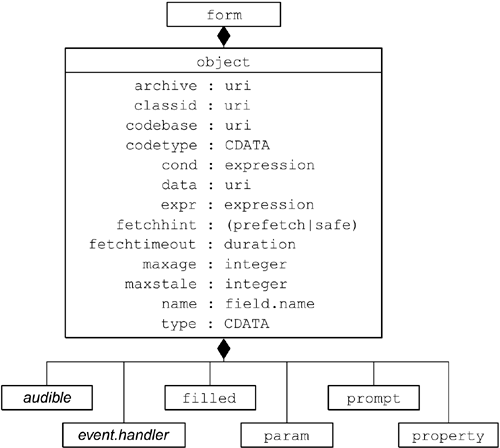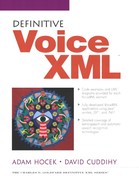3.34. object
| Element type | object |
| Attributes | archive | classid | codebase | codetype | cond | data | expr | fetchhint | fetchtimeout | maxage (2.0) | maxstale (2.0) | name | type |
| Parents | form |
| Children | PCDATA | audio | catch | enumerate | error | filled | help | noinput | nomatch | param | prompt | property | value |
| Description | The object element is used to call platform-specific functionality resident in the VoiceXML interpreter itself. The implementation of the object element by VoiceXML platforms is intended to provide a way to call methods written in some object-oriented programming language like C++ or Java on native VoiceXML objects. |
DTD
<!ELEMENT object (%audio; | %event.handler; | filled | param | prompt | property)* > <!ATTLIST object %item.attrs; %cache.attrs; classid %uri; #IMPLIED codebase %uri; #IMPLIED data %uri; #IMPLIED type CDATA #IMPLIED codetype CDATA #IMPLIED archive %uri; #IMPLIED >
Language model

Attributes
archive : uri
A space separated list of URIs for resources required by the implementing class.
classid : uri
The URI of the class containing the method to call. The URI convention is platform-specific.
codebase : uri
The base path used to resolve relative URIs specified by classid, data, and archive. It defaults to the base URI of the current document.
codetype : CDATA
The type of data stored at the URI specified with the classid attribute.
cond : expression = true
A guard condition associated with this form item, written as an ECMAScript expression. This expression must evaluate to true for the Form Interpretation Algorithm to visit this form item.
data : uri
The URI specifying the location of the object's data. If it is a relative URI, it is interpreted relative to the codebase attribute.
expr : expression = undefined
An ECMAScript expression defining an initial value for this form item. The Form Interpretation Algorithm will visit object only if the expression evaluates to undefined.
fetchhint : (prefetch | safe)
Indicates whether the interpreter may prefetch the destination document specified by this element's next attribute. A value of prefetch indicates the resource may be retrieved at the time the containing VoiceXML document is retrieved. A value of safe indicates that the resource specified by this element should not be prefetched, but should instead be retrieved at the time that the interpreter executes this element.
fetchtimeout : duration
The interval to wait for the content to be returned before throwing an error.badfetch event. If this attribute is not specified, the interpreter derives a value from the most locally scoped fetchtimeout property.
maxage : integer
Indicates the maximum allowable age of the fetched document in seconds. If the cached copy is older than the specified maxage, a new copy will be fetched when the interpreter executes this element. If this attribute is not specified, the interpreter derives a value from the most locally scoped maxage property. If no maxstale attribute is defined and it is impossible to fetch a new copy on the content the interpreter will throw an error.badfetch instead of using stale content.
maxstale : integer
Indicates that the interpreter may use stale content for this element as long as its age is no older than maxage plus the value of maxstale in seconds. If this attribute is not specified, the interpreter derives a value from the most locally scoped maxstale property.
name : field.name
The name associated with this form item. When the caller fills this form-item, by producing an utterance that matches that item's grammar, the value will be stored in a variable of this name visible from within the containing form element.
type : CDATA
The data type of the contents of the URI specified with the data attribute.
Children
param element
Is used to pass parameters to the object call.
prompt and any audible child of object
Are played before executing the native object call.
event.handler elements
Specify event handlers local to the scope of this object element.
property element
Is used to specify interpreter properties local to this object element.
Examples
Example 3-40. Using object to access platform-specific features
<?xml version="1.0" encoding="iso-8859-1"?>
<vxml version="2.0">
<form id="authenticate">
<field name="userid" type="digits">
<prompt>Please enter your user-id.</prompt>
</field>
<object name="verified" type="boolean"
codebase="www.example.com/voiceJars"
classid="method://NativeSpeakerAuthentication.authenticate"
data="SpeakerAuth.jar" codetype="lang/java">
<param name="userID" expr="userid"/>
<param name="tolerance" expr=".10"/>
</object>
<filled>
<if cond="verified=='true'">
<prompt>Login successful.</prompt>
<submit next="www.example.com/accessAccount"
namelist="userid"/>
<else/>
<prompt>Voiceprint unsuccessful. Goodbye.</prompt>
<disconnect/>
</if>
</filled>
</form>
</vxml>
|
